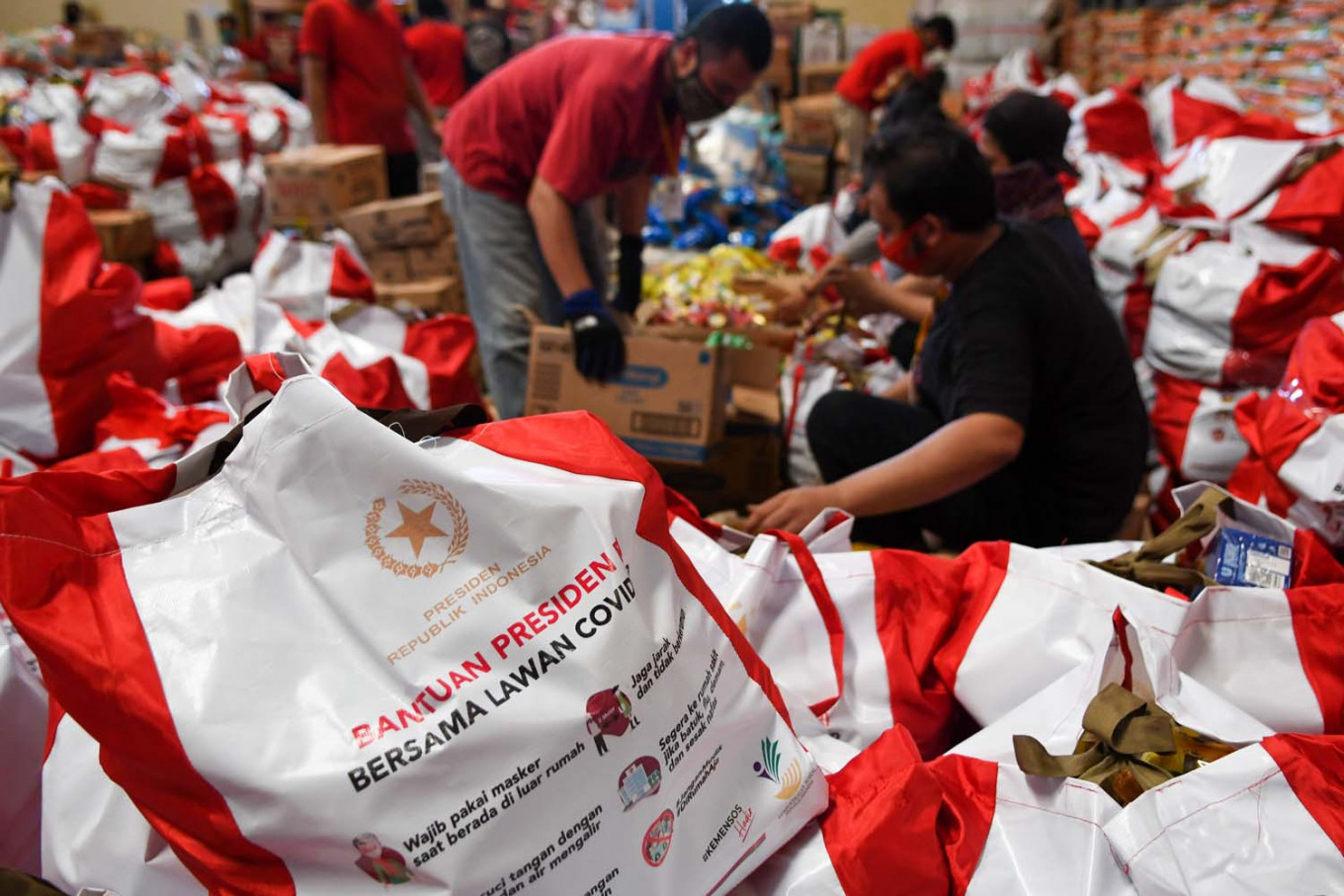Popular Reads
Top Results
Can't find what you're looking for?
View all search resultsPopular Reads
Top Results
Can't find what you're looking for?
View all search resultsStaple food distribution hampered as bags with President's message run short
Change text size
Gift Premium Articles
to Anyone
 Workers from Jakarta-owned food security company PT Food Station Tjipinang Jaya are seen packing staple food into red-and-white cloth bags with a printed message that reads: “Aid from the President of the Republic of Indonesia, Together We Fight COVID-19” at the firm's warehouse in East Jakarta on April 22.
(Antara/M Risyal Hidayat)
Workers from Jakarta-owned food security company PT Food Station Tjipinang Jaya are seen packing staple food into red-and-white cloth bags with a printed message that reads: “Aid from the President of the Republic of Indonesia, Together We Fight COVID-19” at the firm's warehouse in East Jakarta on April 22.
(Antara/M Risyal Hidayat)
S
everal companies in Greater Jakarta that the government has appointed to help pack staple foods to be distributed to families affected by COVID-19 have reported delays caused by a shortage of special bags printed with a message from the President.
Jakarta-owned food security company PT Food Station Tjipinang Jaya has recently been busy packing staple foods into red-and-white cloth bags with the printed message: “Aid from the President of the Republic of Indonesia, Together We Fight COVID-19”.
One of the firm’s workers, who spoke on the condition of anonymity, said his company had received an order to pack 20,000 bags per day since mid-April, but they did not meet the target recently because of insufficient packaging.
“We’re supposed to pack 20,000 aid packages per day. But we can only do 5,000 because of the number of cloth bags available,” the worker told tempo.co on Tuesday, adding that the company was trying to keep the aid distribution going.
There are about 300 workers in Food Station working in three shifts, each consisting of 100 people and divided into 10 groups. Besides packing, workers also load the aid packages onto trucks, before officials distribute them to residents.
Food Station president director Arief Prasetyo Adi declined to comment on the matter, saying only that they were focused on working fast so that the community could receive the aid as soon as possible.
The company’s operational director, Frans M. Tambunan, said the Social Affairs Ministry had tasked them with preparing a total of 277,649 aid packages to be distributed every two weeks for six distribution periods.
Frans said that the aid packing began on April 16 and would end on June 29. The aid packages would be distributed to East Jakarta residents by state-owned postal company PT Pos Indonesia.
Read also: Govt to give cash aid to 4.1 million people affected by COVID-19 in Greater Jakarta
The government plans to provide aid packages for 3.7 million poor families in Jakarta, with the central government preparing food for 2.6 million families, while the Jakarta administration handles the remaining 1.1 million.
President Joko “Jokowi” Widodo recently said he had allocated Rp 2.2 trillion (US$138 million) for the distribution of staple food packages, each worth Rp 600,000 per month, for three-month assistance to Jakarta residents.
The central government has also allocated a budget of Rp 1 trillion for similar food-package distribution to 1.6 million people living in Jakarta’s satellite cities including Bogor, Depok and Bekasi in West Java and Tangerang in Banten.
In addition to Food Station, the government is also working closely with logistics companies and warehouses in North Jakarta, Tangerang and Bekasi and Karawang, West Java, to help prepare the staple food distribution.
In Marunda Center, Bekasi, a source told tempo.co that the aid distribution had once stopped, after only reaching 5 percent of target, because Sri Rejeki Isman (Sritex), a textile factory in Sukoharjo, Central Java, was late sending the packaging bags.
Sritex president director Iwan Setiawan Lukminto confirmed that his company was one of the bag providers, but denied the claim that there had been delays in production. “We are always on time,” he said.
Iwan declined to detail the volume of production the factory was responsible for. “The Social Affairs Ministry handles those calculations,” he added.
Presidential spokesman Fadjroel Rachman was not immediately available to provide clarification or comments regarding this matter when contacted by The Jakarta Post on Wednesday.
Read also: Staple food imports arriving in May to safeguard stocks, prices: Airlangga
Indonesia Corruption Watch said the main problem lay in the way many social aid programs were split between the central government and regional administrations, so each responsible party felt the need to put their mark on their assistance.
“I think, what the government should do to prevent chaotic management is to simplify these various assistance efforts and make them into a single social program,” ICW coordinator Adnan Topan Husodo told the Post on Wednesday.
Under one program, he added, the government could also update the beneficiary’s data and avoid incidents such as one family receiving multiple aid deliveries through similar programs, or those not affected by the virus receiving assistance.
“Otherwise, I think problems like this will continue to emerge. If the central government packs the aid [this way], the regional administrations will certainly do the same in their own way,” he said. (syk)









